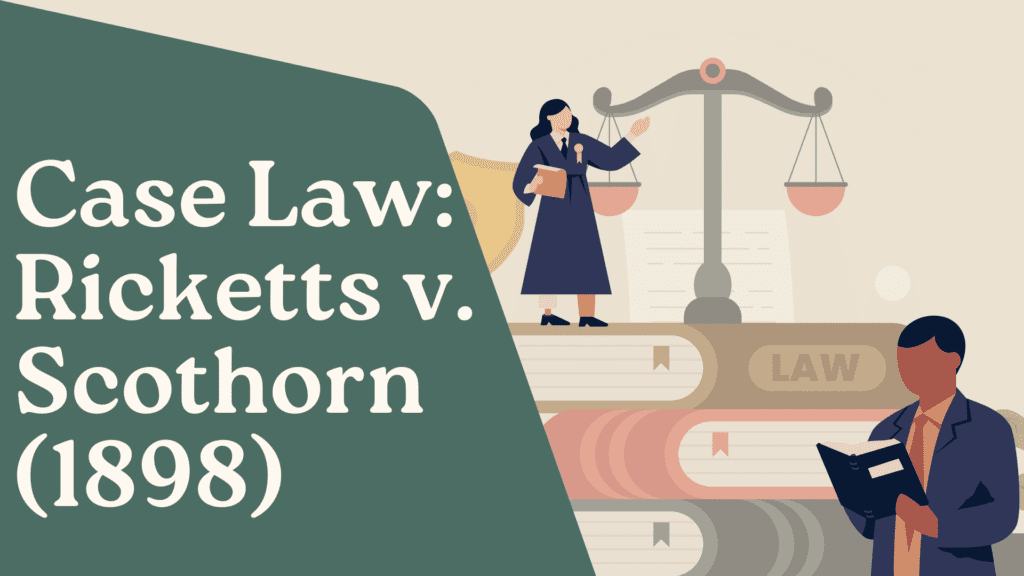
‘Promissory Estoppel’ is a legal doctrine commonly used in contract law that refers to when a promise is enforceable by law, even if that promise is made ‘without formal consideration‘. What this means is that parties will be held responsible for their promises, particularly if one side is detrimentally impacted by agreeing to fulfil the promise, like in the following case law example of Ricketts v. Scothorn (1898).
Facts of the Case
In the case of Ricketts v. Scothorn (1898), Katie Scothorn sued Andrew Ricketts, the executor of her grandfather’s estate. She alleged that Ricketts failed to fulfill an agreement involving a promissory note from her grandfather.
Kaite Scothorn’s lawsuit stemmed from a contract breach where her grandfather had given her a promissory note valued at $2,000 with a 6% interest rate. He assured her that she need not work, prompting her to resign from her job as a bookkeeper, relying on the note for financial support. While her grandfather paid the interest for a year, upon his passing, the executor of the estate declined to honor the principal amount, citing a lack of consideration.
Rule of Law
Equitable estoppel prevents a party of a contract from claiming lack of consideration when their own actions induced reliance by the other party.
Argument from plaintiff in error (Andrew Ricketts):
- A promissory note without a valuable consideration cannot be enforced.
- A consideration must be alleged and proved.
- Katie Scothorn’s liberty to continue her current job or to find a new job was not dependent on whether she received the note.
Argument from defendant in error (Katie Scothorn)
- There was consideration for the execution of the promissory note.
- The note was given to induce her to quit her job.
- The consideration was that she should quit her job as a bookkeeper and stop working for a living.
Issue:
Is there any legal principle that could make a contract enforceable even in the absence of consideration, such as equitable estoppel?
The Procedural History of the Case:
Scothorn filed the lawsuit against Ricketts, seeking to recover the remaining amount of money. The trial court ruled in favor of Scothorn, and Ricketts appealed the decision.
The appellate court affirms the trial court’s decision in support of Scothorn, by recognizing the validity of Scothorn’s claim under the principal of promissory estoppel.
The court found that her grandfather’s intention was for Scothorn to resign from her job, as evidenced by the promissory note. She did quit her job on reliance of this promise. Considering the adverse impact on Scothorn out of her reliance on the promise, it would be unjust to deny the promise.
Holding:
The court ruled that there is an equitable estoppel that preclude Andrew Ricketts, the executor, from claiming the promissory note is lacking consideration or one of the essential elements of a valid contract.
The court found that her grandfather’s intention was for Scothorn to resign from her job, as evidenced by the promissory note (her grandfather promised to pay her $2,000 per year for life), and she did quit her job on reliance of this promise. Considering the adverse impact on Scothorn due to her reliance on the promise, it would be unjust to deny the promise only because it was made without consideration.
Court’s Reasoning:
- Scothorn’s right to the money was simply a gift made by her grandfather, and it was not dependent on any action or forbearance.
- An individual cannot effectively defend themselves in a legal action related to a promissory note given to entities such as a church, college, or similar institution that has been expended or obligations incurred by claiming that there was no valid consideration.
- However, if the recipient of the payment alters their circumstances to their detriment based on the promise made, they gain the legal right to take action. (This is known as Equitable estoppel).
Key Reference Cases:
This isn’t the only case law example that features equitable estoppel:
- Barnes v. Perine, 12 N.Y. 18; Philomath College v. Hartless, 6 Ore. 158; Thompson v. Mercer County, 40 Ill. 379; Irwin v. Lombard University, 56 O. St. 9.
- Reimensnyder v. Gans, 110 Pa. St. 17, 2 Atl. Rep. 425
- McClure v. Wilson, 43 Ill. 356; Trustees v. Garvey, 53 Ill. 401.
Lessons from Ricketts v. Scothorn
Ricketts v. Scothorn (1898) is a prime case law example of promissory estoppel, whereby we learn that promissory estoppel can make a promise enforceable without consideration and that there is a distinction between a gift and a contract.
- A gift is the voluntary transfer of property from A to B without expecting anything in return. There is no requirement for consideration in a gift, and it generally cannot be revoked by the donor.
- A contract is a legally binding agreement between two or more parties that is based on mutual agreement. Consideration is a vital element in a contract and contracts may have conditions for termination or revocation
Disclaimer: The content presented in this article is intended for informational purposes only and represents study notes. It is not intended as legal advice. While efforts have been made to ensure accuracy, the information provided may not be entirely comprehensive or up-to-date. Readers are encouraged to seek professional legal counsel or verification for any specific legal issues or concerns they may have. The author does not guarantee the accuracy, completeness, or reliability of the information contained herein, and thus shall not be held responsible for any consequences resulting from its use.
Further Reading
US law honors precedents, making learning law similar to learning a great deal of past case law examples. Contract law is a particularly hefty subject with plenty of cases to review. Below are a few to get the ball rolling:
- Hamer v Sidway (1891): Does abstaining from legal rights constitute a contract?
- Bolin Farms v American Cotton Shipper (1973): Forward sales agreement turned sour.


Comments
Pingback: Legal Insights: Lessons from Bolin Farms v American Cotton Shipper - CovertProfession
Pingback: Hamer v Sidway (1891): An Important Contract Law Example - CovertProfession